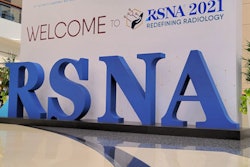
Does your work atmosphere feel joyful? Is your department overflowing with positive energy? If not, authors in the European Journal of Radiology have offered advice on creating joy in the workplace.
"Why should one care if the workplace is a source of happiness?" asked corresponding author Dr. David Yousem, professor in the division of neuroradiology and associate dean of professional development at Johns Hopkins Medicine in Baltimore, Maryland, U.S., and winner of the 2018 RSNA Outstanding Educator award, and joint first authors Dr. Rozita Jalilianhasanpour and Dr. Shadi Asadollahi.
The group answered this question by citing the huge costs associated with an unhappy work environment: increased absenteeism, high employee turnover, reduced productivity, epidemic levels of "mental health days," time wasted dealing with adverse events/root cause analyses/recruitments, and added expense/time for human resources counselors dealing with inappropriate behavior.
Being joyful at work is not simply about the absence of stress, fatigue, and burnout, but a complex fusion of other emotions, and this leads the team to give the following advice:
- Ensure everyone knows about the visions and values of the institution
Feeling happy at work requires that the staff are committed to the primary ideals and guiding principles of the organization, as well as that the team members believe in the greater cause and that their work is meaningful and serves a purpose. A well-crafted mission statement can help here.
- Seek input and active involvement of the whole team
A "top-down Queen bee approach" from the executive team does not lead to staff feeling empowered, the authors noted. Inclusion does not stop at ethnic diversity, and it is important for everyone's voice to be heard, and contributing to the greater cause can bring feelings of pride and joy for everyone.
- Improve the physical workspace
Creating joy through the work environment promotes cheerfulness and increases employee engagement, according to the authors. They suggest this may be achieved by designing appealing in/outdoor spaces for people to gather. Installing ergonomically designed furniture and planting abundant greenery can boost morale and promote teamwork, camaraderie, and the exchange of ideas.
- Show daily gratitude to colleagues
Expressions of gratitude, appreciation, humor, and celebration in the workplace lead to the association of the job site with feelings of pleasure and satisfaction, they say. Setting aside time in group meetings to acknowledge others, recognizing employee contributions in newsletters, and hailing an exceptional employee each month can have an impact.
- Provide good leadership
A grateful and joyful staff member may stem from leaders who identify potential areas of progress, motivate others, and help colleagues achieve personal desired goals. Nurturing hope enables staff to endure hardships and bounce back in ways that increase their performance. "A workroom full of hope for improvement bolsters security and drives progress," they wrote.
- Develop professional work-based relationships
Because of the increasing isolation caused by dispersed work settings in the COVID-19 era, participation in group activities and volunteer community efforts that the institution may have supported are becoming increasingly rare. However, there is still a need to maintain camaraderie among colleagues, and it is even more important to build group cohesiveness and promote teamwork.
- Encourage wellness activities
The authors advocate creating opportunities for activities known to increase physical and emotional wellness, such as yoga, mindfulness, meditation, and exercise programs to be built into daily work routines.
- Celebrate achievements and milestones
Work celebrations such as service milestones, new team members, retirements, academic achievements (grants, research awards, published manuscripts), and triumphant board examination results are all causes for staff celebrations. Often those who receive the recognition will credit others in the group, which multiplies happiness, they wrote.
- Acknowledge research and training efforts
Team members who spend time protocoling studies, meeting with clinicians, monitoring patients, and teaching medical trainees may feel devalued in a compensation scheme that emphasizes clinical productivity, according to the authors. When the research achievements of the clinical faculty are not rewarded despite being part of the academic mission, this can be disheartening. An incentive scheme that is vetted by the entire faculty, after proposals by a diverse committee, leads to a happier workplace.
- Consider appointing a wellness/joyfulness ambassador
It might be a good idea to appoint someone whose goal is to create a jovial atmosphere. It's wise to look outwardly at opportunities for staff members to grow.
 Celebration of Persian Nowruz holiday at Johns Hopkins. All photos courtesy of Dr. David Yousem.
Celebration of Persian Nowruz holiday at Johns Hopkins. All photos courtesy of Dr. David Yousem. Fellows' graduation party at Johns Hopkins.
Fellows' graduation party at Johns Hopkins. Dr. David Yousem celebrating Halloween at work at Johns Hopkins.
Dr. David Yousem celebrating Halloween at work at Johns Hopkins."Creating a joyful workplace begins with employees being committed to the mission, vision, and values espoused by and implemented by leadership, but created with workforce input," Yousem and colleagues pointed out.
Equitable compensation is important to staff, but recognition for their contributions and the high quality of their care also solicits feelings of self-worth and enjoyment at work, they concluded.



















